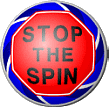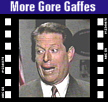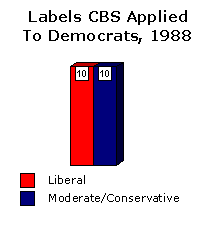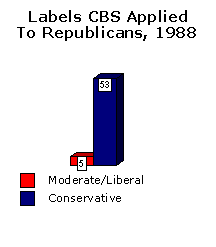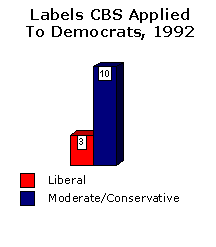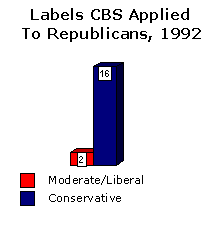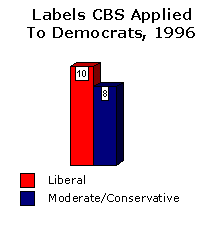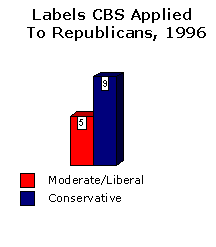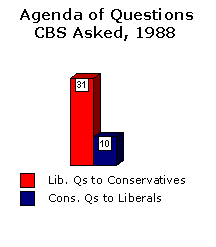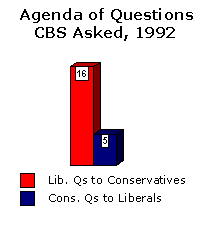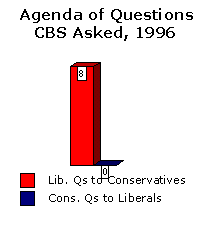|
|||||||||||||||||||||||||||||||||
|
|
|||||||
 |
||||||||||||||||||||||||
|
||||||||||||||||||||||||
 |
||||||
|
||||||
 |
||||||||||||||||||
|
||||||||||||||||||
 |
||||||||||||
|
 |
||||||||||||||||||||||||
|
||||||||||||||||||||||||
 |
|||||||||||||||
|
|||||||||||||||
|
CBS News Labeling and Questions At Republican and Democratic National Conventions, 1988-1996 Use of Labeling George Washington University Professor William C. Adams conducted the first exhaustive examination of the networks’ prime time convention coverage in 1984. The findings? Unequal treatment of the Democratic and Republican National Conventions by network anchors and correspondents. In his landmark study, Prof. Adams found that correspondents cast Republicans as ideologues by frequently labeling them "conservative" or "right-wing" while almost never labeling Democrats as "liberal" or "left-wing." Since 1988, analysts at the Media Research Center have applied Prof. Adams’s methodology to broadcast and cable convention coverage, including ABC News coverage. The numbers below demonstrate that in convention coverage, since 1988 CBS News has failed to apply ideological labels in a fair and balanced manner. Overall (1988-1996), CBS News was more than three times as likely to apply ideological labels to conservatives as liberals, with the total being CBS's use of seventy-eight "conservative" labels compared to only twenty-three "liberal" labels. (Read the quotes.)
Agenda of Questions Balanced reporting requires that correspondents periodically don Devil’s advocate hats. One of the most efficient ways of doing this is to pose challenging questions to interviewees — conservative/Republican-agenda questions to Democrats, and liberal/Democratic-agenda questions to Republicans. The numbers below show that CBS News’s performance in this area is shockingly poor. In fact, over the past three conventions, combined data show CBS News anchors and correspondents posed more than three times as many of these challenging questions to Republicans as they did to Democrats. The totals: CBS News asked fifty-five liberal/Democratic-agenda questions of Republicans, compared to only fifteen conservative/Republican-agenda questions of Democrats. (Read the quotes.)
CBS's Use of Labels: The Numbers
CBS's Use of Labels: The Quotes Labeling Delegates Dan Rather finds a label for Republican — but not for Democratic — delegates: "We said in San Diego, we pointed out, that a large percentage of the actual delegates on the floor, not people who spoke from the podium, were members of the quote ‘religious right.’ A very large percentage of these delegates represent organized labor, but we're not seeing that many union/labor people speak from the podium itself." (Broadcasting from Democratic National Convention, 8/26/96) Bob Schieffer warns viewers: "This is a very, very conservative group of Republicans." (Broadcasting from Republican National Convention, 8/17/92) Labeling Platforms Dan Rather pegs the Democratic platform as "middle of the road." (Broadcasting from Democratic National Convention, 7/14/92) Lesley Stahl tags the Republican platform as "extreme:" "The whole purpose of tonight's convention, the whole program, is to diminish the image of this party as extreme because that's what's turning the women off. Four years ago, the main speaker at the convention, the Republican convention, was Pat Buchanan. He was yelling, his pitchforks were raised. Tonight it will be Colin Powell, he will appeal for civility. On the platform, women find that extreme, it's turning them off." (Broadcasting from Republican National Convention, 8/12/96) Labeling Parties Dan Rather describes the Democratic party as "mainstream." (Broadcasting from Democratic National Convention, 7/15/92) Dan Rather frames GOP: "(Buchanan's) job here tonight...was to set a frame of reference around a moral majority right, heavily influenced party." (Broadcasting from Republican National Convention, 8/17/92) Labeling Candidates Bob Schieffer classifies the Democratic nominees of Clinton-Gore "moderate, middle of the road." (Broadcasting from Democratic National Convention, 7/13/92) Dan Rather to Jesse Jackson: "Bill Clinton's been running pretty hard to the right, so far that some Democrats now call him a ‘Republicrat.' Do you go that far?" (Broadcasting from Democratic National Convention, 8/26/96) Dan Rather to Pat Robertson: "True or untrue: that if elected, a President Dole would be more to the right than candidate Dole." (Broadcasting from Republican National Convention, 8/13/96) Ed Bradley demands delegates explain how anyone could support their ticket: "We had talked earlier about the fact that polls show that most of the delegates of this convention are more conservative than Republicans at large. How do you get that message out to people who are not, perhaps, not as conservative as you? How do you convince them to support the Republican ticket, the Republican platform?" (Broadcasting from Republican National Convention, 8/13/96)
Liberal/Democratic-Agenda Questions to Republicans Dan Rather, interviewing Pat Buchanan on his speech, forgoes a question of substance in lieu of an electoral horse race question that cuts in the liberal’s favor: "I hear some talk, and not all of it among Democrats, that you're a kind of walking gender gap. Do you think your speech last night helped President Bush and Dan Quayle with women voters?" (8/18/92) Dan Rather assumes the Democrat’s economic model is correct in this question to Jack Kemp: "But if you cut taxes, isn't that going to drive the deficit even further up, the bond market might collapse? These are the sort of things I hear people talking about." (8/17/92) Connie Chung asks about the issue that generates the most questions from CBS News at Republican National Conventions, here to U.S. Rep. Connie Morella: "Do you think the pro-choice voice has been stifled?" (8/19/92) Liberal/Democratic-Agenda Questions to Democrats, Too Ed Bradley praises Walter Mondale for advocating tax increases: "In 1984 you were very honest, very upfront, very open with the American people. At the convention you said in San Francisco, 'I will raise your taxes. It will be necessary.' There are people today who say that you cannot solve the problems of this country without raising taxes. Your recommendation?" (7/15/92) Paula Zahn pushes the notion that the Democratic Party is not strongly pro-union in a question to Dennis Rivera of the New York City Hospital Union: "On this floor tonight I continue to hear from union members, 'Our voice is simply not being heard by the Democratic Party.'" (7/15/92) Rita Braver suggests the Democratic-party-desired answer to her own question in this softball pitch to Geraldine Ferraro: "That's right, Dan, and there have been times that you could actually feel the floor shaking with all the cheering here [in response to Hillary Clinton's speech]. Mrs. Ferraro, why was there such a huge reception for the First Lady? Is it because she's been such an object of attack?" (8/27/96) Ed Bradley furthers the popular idea that President Clinton has "governed from the right" in a question to U.S. Rep. John Lewis: "Do you think it's going to be difficult [to mobilize Democrats] given the positions he's taken, particularly on welfare, to get some people out?" (8/27/96) Ed Bradley uses a follow-up question to suggest the answer to his previous question and to push a liberal solution to unemployment: "Congressman Dellums was unhappy when the President signed the welfare bill. I know you saw it not as welfare reform but more as a budget cut. What does he [Bill Clinton] have to do to fix it?... When the President is expected to say tonight that he's going to propose a $3.5 billion jobs program for welfare recipients, is that enough?" (8/29/96)
Convention Coverage (by Network): Back to Campaign 2000 Home Page
Home | News Division
| Bozell Columns | CyberAlerts |
||||||||||


